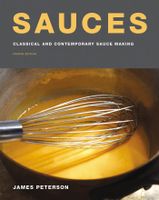Advertisement
Egg Yolks
Appears in
Published 1991
Because they thicken sauces in several ways, egg yolks are versatile liaisons. They provide the base for emulsified sauces such as mayonnaise and hollandaise, and are used in conjunction with cream to finish the cooking liquid of poached meats and fish. They not only form emulsions of fat and liquids but also combine with air, so they can be used for sabayon sauces. They are also used to give richness and texture to crème anglaise.
Egg yolks contain several emulsifiers, among them cholesterol and lecithin, which accounts for their versatility. Many scientific studies have been done to explain the behavior of egg yolks, and a few tips and precautions are especially useful to the saucier. Sauces containing egg yolks should not be allowed to boil (lest they coagulate) unless they contain a large proportion of flour, which stabilizes them. Pastry cream is an example of a sauce made with flour that is boiled after the yolks are added. Egg yolks are also stabilized to some degree by sugar and acids such as lemon and vinegar, but not so much that the yolks can be boiled without curdling. Only flour and hydrocolloid thickeners and emulsifiers can prevent this. If a crème anglaise contains a sufficient proportion of alcohol, the alcohol will boil off before the crème anglaise gets to the temperature needed to set the egg yolks. So if the sauce is bubbling but not thickening, it’s the alcohol.

